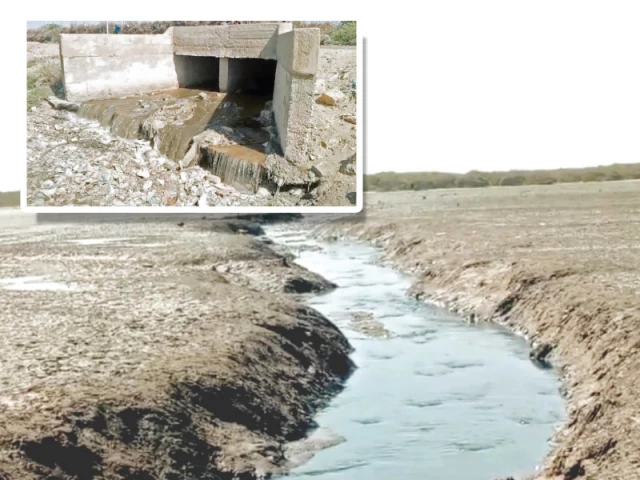Untreated waste destroying coastal areas
With Combined Effluent Treatment Plant project delayed for over 20 years, sewage water is dumped into the sea

Karachi's industrial development, environmental improvement, and marine life protection depend on the long-delayed Combined Effluent Treatment Plant (CETP) project, which has remained incomplete for over 20 years.
Originally planned through joint funding by the federal and Sindh governments, it saw only paperwork and no construction. Despite engineers' efforts, the Sindh government eventually withdrew public funding and shifted the project to a Public-Private Partnership (PPP). Under this new arrangement, instead of five plants, only one treatment facility will be built for the SITE Industrial Zone with a capacity of 20 million gallons daily (MGD), which is likely to be completed by 2032.
A senior official in the Provincial Planning and Development Department revealed that the project was initiated in 2006 when the federal government prepared its feasibility. "In 2007, it was handed over to the Karachi Water and Sewerage Corporation (KW&SC), which in 2009 developed a detailed feasibility and Project Cost-I (PC-I) estimating Rs7.36 billion. No funds were allocated, and in 2016 the Supreme Court ordered immediate construction of treatment plants. Following this directive, KW&SC prepared a new PC-I in 2017 for five CETPs costing Rs11.789 billion, with Sindh's share at 67 per cent and the federal share at 33 per cent," said the official.
Consultations with private firms indicated that imported machinery would raise costs to about Rs18 billion. The federal planning commission, however, instructed that work proceed immediately under the approved cost while a revised PC-I could follow. KW&SC pre-qualified several companies in 2018, and Rs2 billion were allocated in the 2018-19 budget. Later, the Sindh government moved the project to PPP mode, which slowed progress. Engineers warned this would cause delays and inflate costs, but in 2020 the project was formally withdrawn from government funding.
"The project originally belonged to the Industries Department but was assigned to KW&SC due to its technical expertise. The original plan aimed to treat 94 MGD of industrial wastewater through five CETPs before disposal into the sea. Construction was to start in August 2018 and finish by June 2021. Due to fiscal constraints, the provincial finance and local government departments suggested shifting the project to PPP mode. The Executive Committee of the National Economic Council (ECNEC) had approved it in 2017 with a federal share of Rs3.8 billion and a provincial share of Rs7.9 billion," revealed a KW&SC officer.
Reportedly, the proposed CETPs were meant to serve SITE, Trans-Lyari, Federal B Area, North Karachi, Landhi-Korangi, and SITE Superhighway industrial zones. However, in 2020, control was transferred back to the Industries Department. An officer from the Industries Department informed that a few months ago, it was decided that CETP construction would proceed under PPP. Under the new plan, the first plant will be built at Haroonabad for the SITE Industrial Area, handling 20 MGD of industrial effluent. After its completion, similar plants will be developed for other industrial zones.
Currently, around 35 MGD of waste from the SITE area flows untreated through storm drains into the Lyari River and then the sea. The Haroonabad plant will treat 20 MGD of industrial waste, while 15 MGD of domestic sewage will still enter the sea untreated. WWF Technical Advisor Moazzam Khan averred that untreated industrial waste had destroyed the biodiversity of Karachi's coastal areas including Korangi Creek, Gizri Creek, Karachi Port, Port Qasim, Ibrahim Hyderi, and Rehri Goth. "Fishermen still catch fish from deeper, cleaner waters, but continued discharge of untreated waste could permanently damage marine life," warned Khan.
Officials estimate the new feasibility study will take two to three years, after which tenders will be issued and construction completed between 2030 and 2032. Following Haroonabad's completion, CETPs for other industrial zones will be developed gradually. Despite repeated visits, phone calls, and messages, Industries Secretary Yaseen Shar Baloch did not respond to requests for comments.





















COMMENTS
Comments are moderated and generally will be posted if they are on-topic and not abusive.
For more information, please see our Comments FAQ